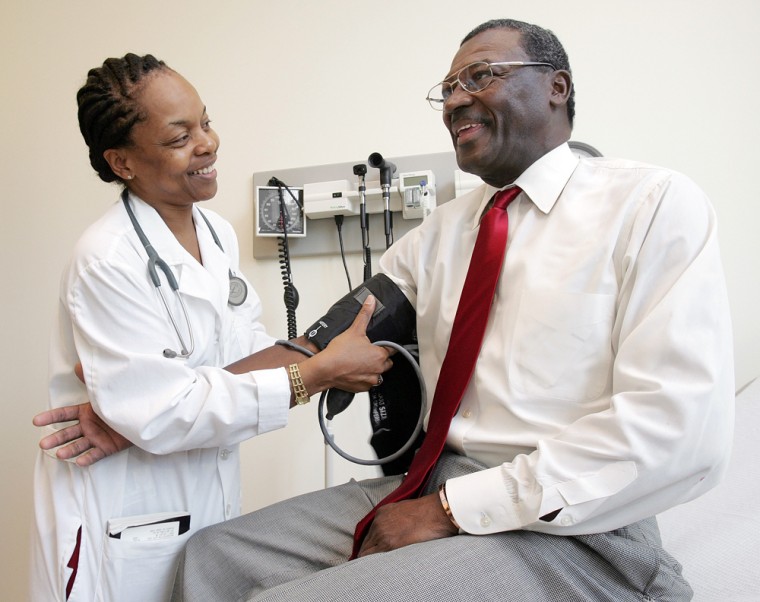Although an avid tennis player and very trim at age 58, Terrell Slayton Jr. has a host of chronic conditions — including diabetes, high blood pressure and high cholesterol. But he knows that many other black men in his community don’t even know the status of their health.
“Even the most learned among us sometimes, for whatever reason, don’t get that checkup as often as we should,” said Slayton, who has learned to balance regular exercise and a medication schedule with his busy role as Georgia’s assistant secretary of state.
A program created by former U.S. Surgeon General Dr. David Satcher and a group of the city’s top leaders — the 100 Black Men of Atlanta Inc. — is aimed at raising health awareness among black men. They are working to first educate themselves about their own health so they can teach others and serve as role models.
“I started the program ... to take advantage of the fact these men are leaders in the community — they were in a position not only to improve their own health but to influence the health of other people,” said Satcher, now interim president of the Morehouse School of Medicine and member of the 100 Black Men group.
A persistent disparity
Addressing blacks’ health matters long has been a concern of health officials. Blacks die of diabetes at a higher rate than whites in this country. They also suffer higher rates of high blood pressure, infant mortality and tuberculosis.
“We know black men have the lowest life expectancy of any group in the country,” said Satcher, a former CDC director. “I noticed here as I’ve noticed in other parts of the country the rate in which black men die early, including physicians, my classmates.”
In February, the Centers for Disease Control and Prevention said black men had a life expectancy of 69.2 years in 2003, compared to 75.4 years for white men.
The program seeks to educate its members — community leaders including former U.N. Ambassador Andrew Young and Atlanta Braves home-run king Hank Aaron — about their health and the importance of related aspects such as proper diet and physical activity. They are given health screenings and any needed follow-up.
“Many of them ... were surprised at some of the things that we found,” said John Grant, executive director and chief operating officer of the 100 Black Men of Atlanta.
Some of the leaders had not been to a doctor in years. Others knew about their chronic diseases yet didn’t have them under control. The screenings helped one member get treated for prostate cancer.
Satcher and other officials hope the pilot program, which started in January, will become part of other 100 Black Men chapters around the country, from San Francisco to Albany, N.Y.
‘We’re defining what mentoring is’
The group’s health push also has been passed on to the children that the group mentors. Officials make sure all food provided to the children during mentoring sessions and other activities is healthy. Mentors teach the importance of starting good health habits early.
“We’re defining what mentoring is,” Grant said. “You cannot have an effective mentoring program if it does not focus on health and wellness.”
For Slayton, a group member, the screenings have confirmed that he has been doing the right things — his blood glucose and blood pressure are in line. Between screenings in January and June, his cholesterol went down 70 points, from 280 to 210.
“If we are the most influential group of 100 black men and people listen to us and maybe they emulate us, we need to practice what we preach,” Slayton added. “You need to know the status of your health.”
